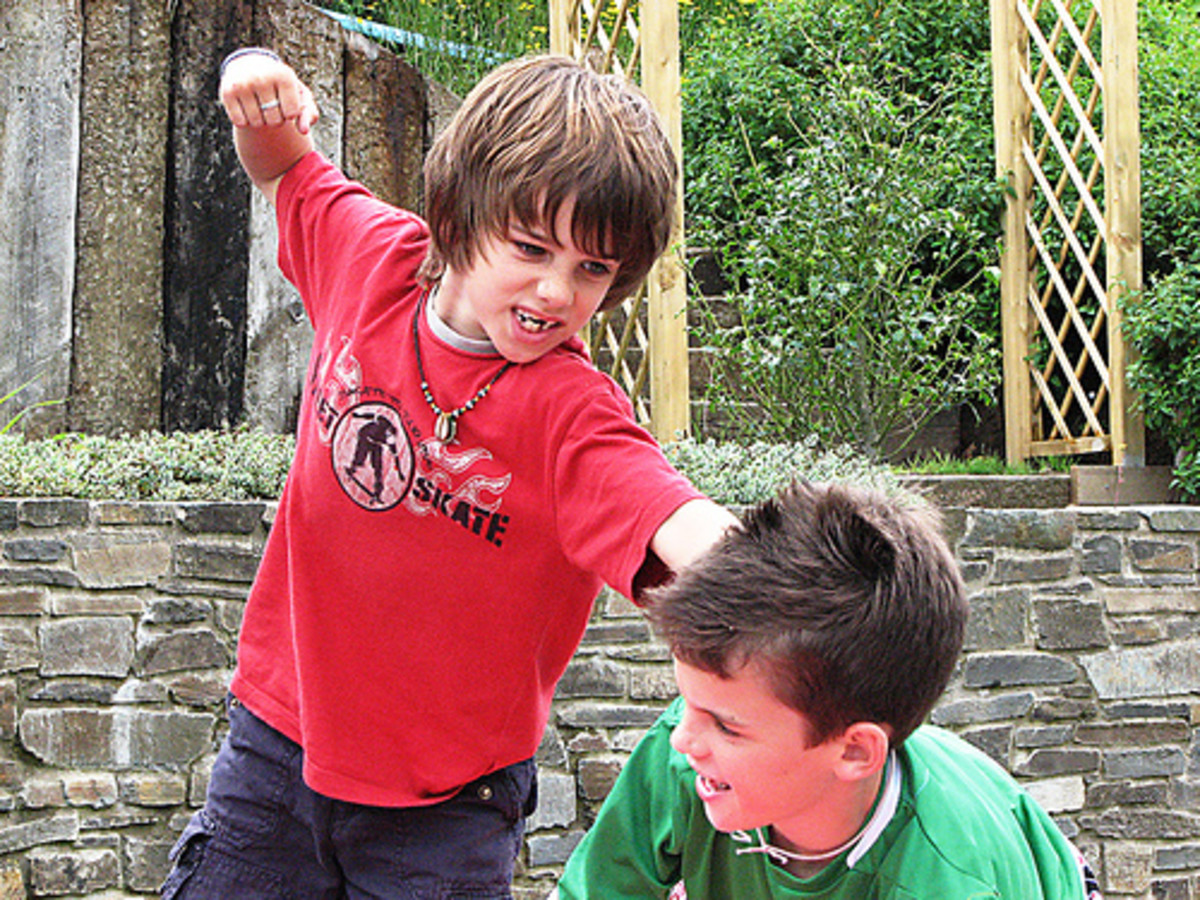Parenting Styles are Associated with Later Adjustment in Children
Introduction
One of the oldest arguments in human developmental science has been the old nature (genes) versus nurture (environment) argument (Ridley, 2003). Psychologists in particular have been very interested in the effects of the environment on child development and how these environmental influences interact with genetic influences during child development. In particular, the effect that parents have on child development has been of interest to clinical, personality, and developmental psychologists since psychology became a discipline (e.g., Freud, 1962).
There is no denying that parents have a tremendous influence on the development of their children. However, this shared aspect of the environment (similar parental rearing practices aimed at siblings) often has been shown to have weaker lasting effects on trait expression in later development than aspects of the environment that are specific to the child (termed non-shared environmental factors; Ridley, 2003). Thus, actual cause and effect relationships between parental rearing styles and the later behavior in children or traits of children have been very difficult to determine for this reason and also because of other ethical methodological concerns (e.g., strict experimental designs are not feasible because you cannot ethically randomly assign infants to parents with a specific style of parenting and then record how they develop; Hatfield, 2013).
Observational studies of children indicate that a number of children raised in considerably different types of environments can grow up and exhibit surprisingly similar personality types, whereas children who are raised in the same environment often grow up and exhibit considerably different personality traits from one another (Ridley, 2003). This suggests the potential for inherent factors to be important, that subtle environmental differences result in large or significant behavioral differences, or that it is the interaction of inherent factors and the environment that is most important. Nonetheless, styles of parental behavior have received a large research focus regarding how these particular parental styles affect the behavior of children later on. The rest of this article will discuss some of this research.
Parenting Styles
There is a considerable body of research that has that has demonstrated significant relationships between parenting styles and later adjustment and development in children. One of the most enduring of these studies occurred in the 1960s by the developmental psychologist, Diana Baumrind. Baumrind (1967) initially performed a correlational study on preschool children using primarily naturalistic observation methods and parental interviews. She was able to identify four important parenting dimensions that were significant: 1) parental disciplinary strategies; 2) parental warmth and nurturance; 3) communication styles between parents and children and; 4) parental expectations of maturity and the amount of control parents exerted over their children. Using these elements of parenting as her guideline Baumrind found that that the majority of parents she observed exhibited one of three parenting styles. Follow-up research suggested the addition of a fourth parenting style (Maccoby & Martin, 1983). The four styles of parenting identified by these studies are:
- Authoritarian parents have strict rules and expect blind obedience to their authority and conformity to parental rules. These parents do not explain the reasoning behind their dictates and failure by the child to adhere to their rules regularly leads to punishment. Authoritarian parents have high demands of their children, are not responsive to their children, are focused on obedience, are status-oriented, and expect their rules and orders to be obeyed without explaining why (Baumrind, 1991).
- Authoritative style parenting is like authoritarian parenting in that parents set up rules and guidelines and expect their children to follow them; however, these parents are much more democratic in their interactions. They are responsive to their children’s questions. If their children fail to meet their expectations they are nurturing, understanding, and forgiving instead of being punishing. Baumrind (1991) observed that parents using this style monitor and convey clear standards for the children’s behavior. The parents are assertive without being restrictive and intrusive (unlike authoritarian parents). They tend to use support and discussion as discipline instead of being punitive. These parents work towards children that are assertive and socially responsible; self-regulated and cooperative.
- Permissive (or indulgent) parents place few demands on their children. They have relatively low expectations of maturity and of self-control in their children and rarely discipline them. Baumrind (1991) observed them to be more responsive than demanding. These parents tend to be more nontraditional and indulgent in their approach, expect self-regulation from even young infants, and tend to avoid confrontation. They are nurturing and communicative with the children, but this relationship is as more of a friend than of a parent.
- Uninvolved(or neglectful) parents make few or no demands, are low in responsiveness, and engage in little communication with children. These parents will satisfy the child's basic needs such as food and shelter, but they are generally indifferent otherwise and in more extreme cases can reject the child or neglect the child’s needs (Maccoby & Martin, 1983).
Each of these parenting styles represents a typology as opposed to a linear combination of the traits of demandingness and responsiveness. So in effect a particular style of parenting is much more than the sum of its parts (Baumrind, 1991). An important aspect in each of these parenting styles is how each style also differs in the extent it is characterized by an additional element: the element psychological control. According to Barber (1996), psychological control “refers to control attempts that intrude into the psychological and emotional development of the child” (p. 3296). This control is exercised by way of such parenting practices like the induction of guilt, shame, or the threatened withdrawal of love. A major differentiation between authoritative and authoritarian parenting styles is in the element of psychological control. Both types of parents will place high demands and expectations on children expecting them to obey their rules; however, authoritarian parents expect children to accept their values, judgments, and goals without question. On the other hand authoritative parents allow more freedom with their children and explain why they set their rules. Consequently, while authoritative and authoritarian parents are both high in the dimension of behavioral control, authoritarian style parents are high in the element of psychological control, whereas, authoritative parents are low in this area (Barber, 1996).

Issues Surrounding the use of Punishment
There has been a lot of controversy regarding the use of punishment with children. Corporal punishment such as spankings are more associated with authoritarian parenting than would be observed other styles of parenting (Hoseini, Ahmadian, & Ravanbakhsh, 2008). Most of the recent research indicates that physical punishment leads to more aggression in children and less internalization of morals (Hoseini, Ahmadian, & Ravanbakhsh, 2008). Other styles of punishment such as yelling and screaming actually serve to model these out-of-control types of behaviors for children. While there certainly is in need to punish children when they misbehave the use of these types of techniques may be more counterproductive than many parents think. What they seem to learn from being yelled at is that when you get angry with someone or disapprove at someone it is okay to yell at them (Hoseini, Ahmadian, & Ravanbakhsh, 2008).
Other forms of punishment such as restricting rights, grounding, timeouts, etc. when used correctly (most parents do not use these correctly) may teach children a more effective means to control their behaviors (Hall, Lindzey, & Campbell, 1998; Hoseini, Ahmadian, & Ravanbakhsh, 2008).In addition, behavioral methods of control such as reinforcement of positive behaviors have been empirically demonstrated to be more effective in behavioral change then punishment of unwanted behaviors (Hall, Lindzey, & Campbell, 1998). In any event, the interaction style of the parents does indeed affect the child's development.
Coparenting
The majority of research indicates that when both parents support one another in raising the children the outcomes are more positive than when there is not this joint support (Wolfradt, Hempel, & Miles, 2003). When parents work together in raising their children there is a sense of harmony, unity, warmth, and cooperation that is not present otherwise. This effect is even observed in children raised by divorced parents. The effect of parental disagreements in child rearing can lead to confusion, playing one side against the other and depersonalization (Wolfradt, Hempel, & Miles, 2003).
The Effect of Parenting Style on Children
Parental style has demonstrated to be a significant predictor of child adjustment and children's well-being in the areas of academic performance, social competence, psychosocial development, and the reduction of problem behaviors (Hoseini, Ahmadian, & Ravanbakhsh, 2008). Findings from interviews with parents, parental observations, and children's self-reports have consistently demonstrated that children and adolescents with authoritative parents are rated by objective measures completed by others as being better adjusted and also rate themselves as more socially and instrumentally capable (e.g., better academic performance) than children and adolescents who come from non-authoritative style parents (Baumrind, 1991; Miller, Cowan, Cowan, & Hetherington, 1993; Shucksmith, Hendry, & Glendinning, 1995; Weiss & Schwarz, 1996).
Of the four parenting styles it has been found that children and adolescents whose parents are uninvolved perform relatively poorer across all domains (social, psychological, and behavioral) than children and adolescents from the other three styles (Kiernan & Huerta, 2008; Lamborn, Mants, Steinberg, & Dornbusch, 1991; Steinberg, Blatt-Eisengart, & Cauffman, 2006; Steinberg, Darling, & Fletcher, 1995).
As a rule, parental responsiveness appears to predict levels of social competence and the child’s overall psychosocial functioning, whereas parental demandingness is predictive of instrumental competency and behavioral control in children (Steinberg, Blatt-Eisengart, & Cauffman, 2006). For example, findings demonstrate that children and adolescents reared in authoritarian families are apt to perform reasonably well in school and not exhibit problem behaviors, but they demonstrated relatively poorer social skills, lower levels of self-esteem, and have higher levels of depression (Darling & Steinberg, 1993; Maccoby, 1992; Steinberg, Blatt-Eisengart, & Cauffman, 2006). Those from indulgent families are more apt to exhibit problem behaviors, perform more poorly in school, but exhibit higher levels of self-esteem, have good social skills, and display less depression (Schwarz, Barton-Henry, & Pruzinsky, 1985; Steinberg, Blatt-Eisengart, & Cauffman, 2006).
There has been research investigating differences in parenting style and child outcome variables in different populations. In the United States the authoritative parenting style occurs most commonly among middle-class intact families of European ancestry, but the positive relationship between authoritative parenting and positive childhood outcomes appears to be very similar across different groups (Cheung & McBride-Chang, 2008; Querido, Warner, & Eyberg, 2002; Steinberg, Blatt-Eisengart, & Cauffman, 2006; Steinberg, Elmen, & Mounts, 1989; Steinberg, Mounts, Lamborn, & Dornbusch, 1991). There have been a few exceptions:
- Authoritative parenting style predicts better outcomes for psychosocial adjustment and less problem behaviors across all groups studied, but it appears associated with better academic performance among European Americans and perhaps Hispanic Americans compared to other groups (Dwairy & Menshar, 2006; Garcia & Gracia, 2009; Steinberg, Darling, & Fletcher, 1995; Steinberg, Dornbusch, & Brown, 1992.
- Demandingness appears to be less significant for girls’ outcomes than for boys (Weiss & Schwarz, 1996). Chao (1994) and Darling & Steinberg (1993) contend that these ethnic differences may reflect differences in social context or the cultural meaning of the elements of styles of parenting.
In reviewing the empirical literature concerning these parenting styles one cannot help but be impressed by the consistency with which being raised in an authoritative environment is associated with positive social and instrumental competences along with lower levels of problem behaviors across gender, ethnic group, and developmental stage (Baumrind, 1989; Buri, Louiselle, Misukanis, & Mueller, 1988; Huver, Otten, De Vries, & Engles, 2010; Palut, 2009). The benefits of an authoritative parenting style appear evident as early as the child’s preschool years and have been demonstrated to continue all the way through adolescence and well into early adulthood. These differences between children reared in authoritative homes and their peers reared in homes with other parenting styles are consistent, but sometimes smaller in magnitude (Timpano et al., 2010; Weiss & Schwarz, 1996). Being reared in an authoritative home is generally associated with children and adolescents who are happier, more capable, and more successful in life and the authoritative personality style is the best of the four styles for children’s welfare (Baumrind, 1989; Maccoby, 1992, Timpano et al., 2010).
Conclusion
While the research outcomes look most positive for children raised by authoritative parents one should note that in reality the distinction between these four parenting styles probably lies on a continuum. For instance, sometimes parents simply must lay down the law without explanation for the safety of the child and in other instances being indulgent or permissive is important and perhaps even beneficial. However, it is the overall pattern of interactions with children that determines what general type of style the parents use, and in this context the research indicates that overall outcomes are more positive for children raised by parents favoring an authoritative approach. However, the influence of inherent factors such as the temperament of the child also influences both the interactions between the child and parents and the outcome of a particular parenting style.
References
Barber, B. K. (1996). Parental psychological control: Revisiting a neglected construct. Child Development, 67(6), 3296-3319.
Baumrind, D. (1967). Child-care practices anteceding three patterns of preschool behavior.Genetic Psychology Monographs, 75, 43-88.
Baumrind, D. (1989). Rearing competent children. In W. Damon (Ed.), Child development today and tomorrow (pp. 349-378). San Francisco: Jossey-Bass.
Baumrind, D. (1991). The influence of parenting style on adolescent competence and substance use. Journal of Early Adolescence, 11(1), 56-95.
Buri, J. R., Louiselle, P. A., Misukanis, T. M., & Mueller, R. A. (1988). Effects of parentalauthoritarianism and authoritativeness on self-esteem. Personality and Social Psychology Bulletin, 14, 271-282.
Chao, R. K. (1994). Beyond parental control and authoritarian parenting style: UnderstandingChinese parenting through the cultural notion of training. Child Development, 65(4), 1111-1119.
Cheung, C. S., & McBride-Chang, C. (2008). Relations of perceived maternal parenting styles,practices, and learning motivation to academic competence in Chinese children. Merrill-Palmer Quarterly, 54 (1), 1-22.
Darling, N., & Steinberg, L. (1993). Parenting style as context: An integrative model.Psychological Bulletin, 113(3), 487-496.
Dwairy, M., & Menshar, K. E (2006). Parenting style, individuation, and mental health of Egyptian adolescents. Journal of Adolescence, 1, 103-117.
Freud, S. (1962). Early psycho-analytic publications. In J. Strachey & A. Freud (Eds.). The standard edition of the complete works of Sigmund Freud: Vol. 3 (pp. 74 -167). London:Hogarth Press.
Garcia, F. & Gracia, E. (2009). Is always authoritative the optimum parenting style? Evidencefrom Spanish families. Adolescence, 44(173), 101-131.
Hall, C. S., Lindzey, G., & Campbell, J. B. (1998). Theories of personality. New York: Wiley.
Hatfield, R. C. (2013). The everything guide to the human brain. Avon, MA: Adams.
Hoseini, N. A., Ahmadian, F., & Ravanbakhsh, M. H. (2008). The study of relationship between parenting styles with self-efficacy and mental health in students. Educational &Psychological Studies, 9, 21-37.
Huver, R. M. E., Otten, R., De Vries, H., & Engles, R. C. M. E. (2010). Personality andparenting style in parents of adolescents. Journal of Adolescence, 3, 395-402.
Kiernan, K. E. & Huerta, M. C. (2008). Economic deprivation, maternal depression, parentingand children’s cognitive and emotional development in early childhood. British Journalof Sociology, 59, 783–806.
Lamborn, S. D., Mants, N. S., Steinberg, L., & Dornbusch, S. M. (1991). Patterns of competence and adjustment among adolescents from authoritative, authoritarian, indulgent, and neglectful families. Child Development, 62, 1049-1106.
Maccoby, E.E. (1992). The role of parents in the socialization of children: An historical overview. Developmental Psychology, 28, 1006-1017.
Maccoby, E. E., & Martin, J. A. (1983). Socialization in the context of the family: Parent–child interaction. In P. H. Mussen (Ed.) & E. M. Hetherington (Vol. Ed.), Handbook of child psychology: Vol. 4. Socialization, personality, and social development (4th ed., pp. 1-101). New York: Wiley.
Miller, N. B., Cowan, P. A., Cowan, C. P., & Hetherington, E. M. (1993). Externalizing in preschoolers and early adolescents: A cross-study replication of a family model. Developmental Psychology, 29(1), 3-18.
Palut, B. (2009). A review on parenting in the Mediterranean countries. Sosyal Bilimler Dergisi, 33, 242-247.
Querido, J. G., Warner, T. D., & Eyberg, S. M. (2002). Parenting styles and child behavior in African-American families of preschool children. Journal of Clinical Child & Adolescent Psychology, 31, 272–277.
Ridley, M. (2003). Nature via nurture: Genes, experience, and what makes us human. New York: Fourth Estate.
Schwarz, J. C., Barton-Henry, M. L., & Pruzinsky, T. (1985). Assessing child-rearing behaviors: A comparison of ratings made by mother, father, child, and sibling on the CRPBI. Child Development, 56(2), 462-479.
Shucksmith, J., Hendry, L., & Glendinning, A. (1995). Models of parenting: implications for adolescent well-being within different types of family contexts. Journal of Adolescence, 18, 253–270.
Steinberg, L., Darling, N., & Fletcher, A. C. (1995). Authoritative parenting and adolescent adjustment: An ecological journey. In P. Moen, G. H. Elder, Jr., & K. Luscher (Eds.), Examining lives in context: Perspectives on the ecology of human development (pp. 423-466). Washington, DC: American Psychological Assn.
Steinberg, L., Blatt-Eisengart, I., & Cauffman, E. (2006). Patterns of competence and adjustment among adolescents from authoritative, authoritarian, indulgent, and neglectful homes: A replication in a sample of serious juvenile offenders. Journal of Research on Adolescence, 16, 47-58.
Steinberg, L., Dornbusch, S. M., & Brown, B. B. (1992). Ethnic differences in adolescent achievement: An ecological perspective. American Psychologist, 47(6), 723-729.
Steinberg, L., Elmen, J. D., & Mounts, N. S. (1989). Authoritative parenting, psychosocial maturity, and academic success among adolescents. Child Development, 60, 1424-1436.
Steinberg, L., Mounts, N., Lamborn, S., & Dornbusch, S. (1991). Authoritative parenting and adolescent adjustment across various ecological niches. Journal of Research on Adolescence,1, 19-36.
Timpano, K. R., Keough, M. E., Mahaffey, B., Schmidt, N. B., & Abramowitz, J. (2010). Parenting and Obsessive Compulsive symptoms: Implications of authoritarian parenting. Journal of Cognitive Psychotherapy: An International Quarterly, 24(3),4-5.
Weiss, L. H., & Schwarz, J. C. (1996). The relationship between parenting types and older adolescents’ personality, academic achievement, adjustment, and substance use. Child Development, 67(5), 2101-2114.
Wolfradt, U., Hempel, S., & Miles, J. N. V. (2003). Perceived parenting styles, depersonalisation, anxiety and coping behaviour in adolescents. Personality and Individual Differences, 34, 521 - 532.








